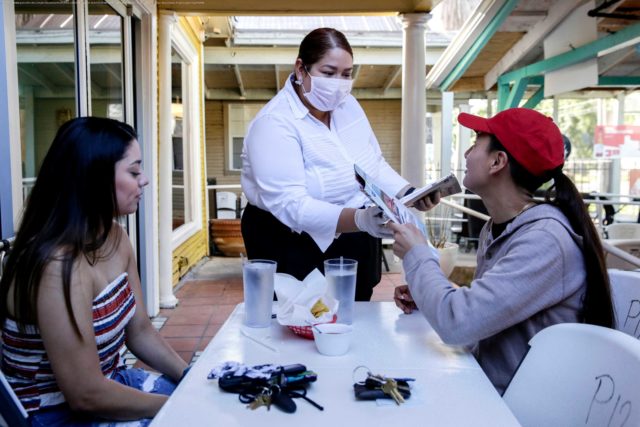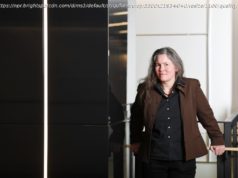SAN FRANCISCO — The nation’s disjointed approach to re-opening has revealed two Americas. One is populated by those eager to reclaim freedom of…
SAN FRANCISCO — The nation’s disjointed approach to re-opening has revealed two Americas.
One is populated by those eager to reclaim freedom of movement and restart the economy, and another by people whose COVID-19 concerns keep them sheltering in place. And often they’re living side by side in a country rocked by 1.2 million coronavirus cases and 75,000 deaths.
In California, which is re-opening cautiously, Jeff Gourley has drawn both heat and praise for welcoming patrons to Nomads Canteen in San Clemente near San Diego.
“I’m not a fool, I’m not unsympathetic,” he says. “But we can’t quarantine the healthy anymore.”
Meanwhile in Georgia, where Gov. Brian Kemp has pushed for a faster opening, Atlanta public relations exec Jenny Moss isn’t ready to resume old habits.
“My response is pretty simple,” she says. “In the time between when lockdown began and where we are now, nothing has changed. So I’m taking precautions.»
You can survey just about any U. S. city or town and find examples of both attitudes. Some are shaped by political beliefs, others by economic challenges and a comfort with risk. But despite disagreements over speed, the national re-opening is happening.
A USA TODAY analysis of mobile phone use data shows that people in every state have become more active in recent weeks following a significant reduction in mobility that reached its lowest point in mid-April.
States also are not re-opening at the same pace. The mobility data shows that the 10 states with the lowest leaving-home rates are on the West and East coasts, areas where some governors have been aggressive about self-quarantines.
Of those, seven are in the top 10 for total deaths, including hard-hit New York and New Jersey, where to date a combined 35,000 have died from COVID-19, the pulmonary complications from the virus.
In contrast, the seven states that are almost halfway back to normal movement are in the Plains and Southeast, where death counts were lower and leaders often were more hesitant to restrict movement and eager to resume commerce.
Chang says a lack of national strategy on the re-opening has left it to local officials to comes up with their own rules. But the mutating and contagious nature of the coronavirus will continue to pose a threat if group contact is reinitiated too soon.
“Is there a community where people don’t get the flu? No,” he says. “Some parts of the country may feel that this virus hasn’t or can’t or won’t affect them, but the virus will find them.”
“People in the most pro-Trump counties had reduced their visits to nearby points of interest down to about 42%, whereas that number was 64% in less ‘Trumpy’ places,” says Stanford graduate student Levi Boxell, who worked on the research.
Boxell says individuals seem to be basing their decisions less on government orders and more on a mix of risk perception and economic incentives.
USA TODAY’s analysis confirms that residents of counties and states that voted most heavily for President Donald Trump in 2016 left home more frequently than others during peak quarantine and are now closer to returning to pre-COVID-19 levels of activity.
Lindy Thompson owns the Sage Matt Café in the north Texas panhandle town of Miami, a hub of the nation’s most pro-Trump county where the president garnered 95% of the vote in 2016.
Texas has 1,100 coronavirus-related deaths. People in Miami and the surrounding Texas county are just shy of halfway back to February levels of activity from April’s low, USA TODAY’s analysis found.
Although Thompson, 39, reopened her eatery on the day Gov. Greg Abbott allowed it on May 1, she says the shelter in place orders are “not a red or blue issue here, people took it seriously even though we’re rural.”
Her customers are slowly coming back, though take-out is still popular. To stay safe, tables are six feet apart and no condiments can be shared.
«And I’m OCD about my cleaning,» she says.
In Tuscaloosa, Alabama, another Trump stronghold, florist Sarah Morrison, 33, recently reopened her Tuscaloosa Flower Shoppe in time for Mother’s Day.
Домой
United States
USA — Science Across US, a 'tale of two cities' as some embrace reopening amid...






